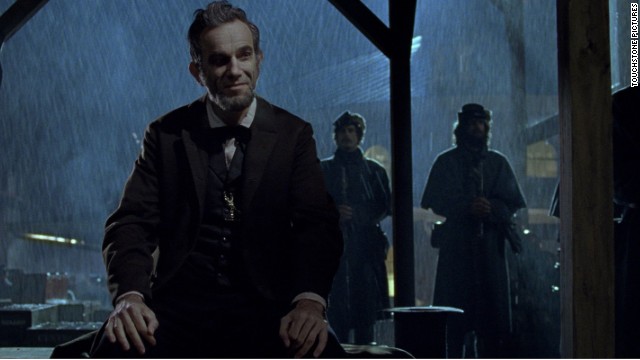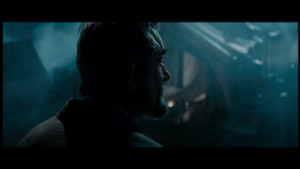
- Day-Lewis' performance has a beautiful gravitas, yet there's nothing too severe about it
- He gives Lincoln a surprisingly plainspoken, reedy high voice that retains the courtly cadences of the South
- "Lincoln" brilliantly dramatizes the delicacy of politics, along with the raw brutality of it
(EW.com) -- As the title character of Steven Spielberg's solemnly transfixing "Lincoln," Daniel Day-Lewis is tall and elegantly stooped, with thatchy gray-black hair, sunken cheeks, and a grin that tugs at the corners of his mouth whenever he tries to win someone over by telling them a good story (which is often).
Day-Lewis looks so much like the photographs of Abraham Lincoln that you don't have to squint, even a bit, to buy that it's him. He nails Lincoln's thousand-yard stare — a gaze directed at once inward (at the whir of his own mental machinery) and outward (at the cosmic hum of history).
 MOVIE PASS: "LINCOLN"
MOVIE PASS: "LINCOLN"
 Movie Pass: "Anna Karenina"
Movie Pass: "Anna Karenina"
Day-Lewis' performance has a beautiful gravitas, yet there's nothing too severe about it. He gives Lincoln a surprisingly plainspoken, reedy high voice that retains the courtly cadences of the South. That voice — from everything we know, it's quite accurate — makes Lincoln sound like Will Rogers as a professor of human nature. This Lincoln lives deep inside his own unruly-haired head, yet he loves the people around him, even the ignorant (and racist) common folk, who repay the favor by loving him back. And that's where he draws his political force.
"Lincoln," which Spielberg has directed from a lyrical, ingeniously structured screenplay by Tony Kushner, is one of the most authentic biographical dramas I've ever seen. But that doesn't mean it's a stiff-jointed history lesson. The movie is grand and immersive. It plugs us into the final months of Lincoln's presidency with a purity that makes us feel transported as though by time machine. (Kushner is the husband of EW columnist Mark Harris.)
Most of the film unfolds in January 1865, shortly after Lincoln's reelection, when he knows that the North is going to win the Civil War. The real battle for him now is the fight against slavery. Three commissioners from the Confederacy head up to Washington City, and Lincoln is confident that he could have their surrender within a week. But before that can happen, he is driven to pass the 13th Amendment, which would outlaw slavery. The Democrats hate the amendment, and even Lincoln's liberal Republican comrades want him to delay the vote. Only Lincoln grasps the stakes: that once the Civil War is over, the amendment won't pass — it will be blocked by the Southern states. Winning the war could prove a Pyrrhic victory. Only by threading the amendment through the eye of a legislative needle can he alter the course of history.
Lincoln features a great deal of incendiary speech-making on the floor of the House of Representatives, and Kushner's script, which is based in part on the Doris Kearns Goodwin book Team of Rivals: The Political Genius of Abraham Lincoln, has a lot of fun weaving insults of astonishing brazenness into oratory that lays bare the issues in all their gripping moral complexity. Spielberg, denying himself visual fireworks, frames the action with a kind of stately tension. He thrillingly demythologizes Lincoln by placing us inside Lincoln's experience — shut up by himself (or with his querulous cabinet) in the drab meeting rooms of the White House, or in his bedroom with the ambitious, haunted Mary Todd Lincoln (Sally Field), who still blames Abe for the death of their son Willie. Field's performance is shattering — in a few furious scenes, she redefines this First Lady as a woman whose supposed madness reflected a humane fervor as sterling as her husband's.
As the congressional fight rages on, "Lincoln" orchestrates it all. He seduces, cajoles, begs, and tyrannizes. He offers patronage jobs — bribes — to the Democratic congressmen who support slavery. He courts but also tamps down the influence of Thaddeus Stevens (Tommy Lee Jones), the abolitionist who's so possessed by the cause that he might alienate any congressman on the fence. And through it all, Lincoln must delay the war's end — without breaking the people's faith. The Lincoln we see here is that rare movie creature, a heroic thinker. He has the serpentine intellect of a master lawyer, infused with a poet's passion.
"Lincoln" brilliantly dramatizes the delicacy of politics, along with the raw brutality of it. All that's pushing the amendment forward is Abe Lincoln's will, his ability to do anything — even flirt with impeachable deceptions — to fulfill his vision of justice. And that's why he spends the movie alone in spirit. When he bangs his hand on the table, roaring at his lobbyists to procure him the votes he needs because he's ''clothed in immense power,'' we're seeing the birth of the presidency as we know it — a force that can shape the consciousness of the world. Lincoln is a stirring paradox, a dream of history as it might truly have happened. A
See the original article at EW.com.
CLICK HERE to Try 2 RISK FREE issues of Entertainment Weekly
© 2011 Entertainment Weekly and Time Inc. All rights reserved.